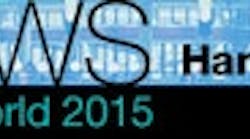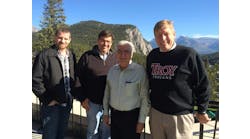“Just look at the language we use to discuss change, and you will see the root of the problem,” Biermann said. “Most of the time we talk about ‘reacting’ to change; but where are the leaders who are creating change?”
The business definition of change, Biermann said, is “an event that occurs when a company decides to alter process, people or structure in response to internal and external stimuli.
“That’s not the standard definition; and it’s not the definition most people think of,” Biermann said. “It is a proactive, creative definition focused on the verb, ‘decide.’”
And it’s the definition put in place by former Ford Motor Company President and CEO Alan Mulally, who led the transformation of Ford from a company posting quarterly losses close to $18 billion during the American auto recession of 2008 into a profitable company widely heralded as a leader in the global automotive industry today.
Addressing conference attendees on Tuesday, Mulally laid out the sweeping changes he put in place, from shedding dozens of auto lines to re-negotiating union contracts and instituting weekly “Business Plan Review” meetings in which he forced his leadership team to embrace transparency and report openly on the problems the company faced daily.
“Alan forced a change in behavior,” Biermann said. “It was uncomfortable and scary, and years later we still see people wanting to slip back into their old, comfortable ways.”
"The world is moving on and you have to know if you’re holding onto something that is holding you back.” Ford Motor's Kathy Biermann discussed the various ways that people react to change, and strategies for proactively embracing it.
To keep the Ford team on track, Mulally created credit-card-sized cards that listed the behaviors he expected from his team: the behaviors that supported transparency. Mulally showed off his card on Tuesday; Biermann pulled hers out today.“This is how we stay aligned,” Biermann said. “These cards outline the behaviors we are expected to exhibit. We review them before every meeting. They align our behavior with the values that Alan laid out, and the executive team is measured on its behaviors.”
And it is this focus on behavior, as opposed to thoughts and beliefs, that is the key to managing change, Biermann said.
“The ability to manage change has nothing to do with what we feel or believe or fear,” she said. “It has to do with how we act, and how well that action aligns with our values.”
Types of change
In addition to having multiple definitions, change also comes in different types. Biermann stressed the importance of being able to identify these different types of change—evolutionary, shock and strategic—and act appropriately.
Evolutionary change is natural and always, slowly, occurring. Shock change, Bierman said, is the one that can be dangerous and disruptive.
“Shock change happens when your boss quits or when a start-up company introduces a truly disruptive technology as Tesla has done in the automotive industry.”
Resilience is the key to surviving shock change, Biermann said.
“Resilience is less about who we are and more about how we think and choose our reactions,” she said. “Resilient people succeed despite their hardships. They seek out new and challenging experiences. They don’t let anxiety and doubt overwhelm them. Resilient people exhibit a sense of humor and realistic optimism under stress; they don’t feel shame over failures, and they transform helplessness into power not just for themselves, but for those around them.”
Creating change
When it comes to managing people in a changing environment, it’s important to understand how they react and why, Biermann said.
Faced with change, Biermann said people tend to react as follows:
- 15% will cope: They’ll be anxious but they will survive.
- 40% will adapt: They won’t like it, but they’ll do it and they’ll be okay.
- 30% will exploit: They will look for the opportunity.
- 15% will create: They will seek out and create change and push boundaries.
It is this 15% who create strategic change: “Strategic change happens when a company’s leadership decides to move the company in a new direction, toward a new vision of the future,” Biermann said.
As an example of the 15%, Biermann looked no further than the founder of her company, Henry Ford. Biermann shared a 1925 Ford advertisement that showed not illustrations and benefits of the company’s cars but a call to “Make the highways open to all mankind.”
When the automobile was invented, Biermann pointed out, most people were not looking for that solution. Most people never travelled more than 25 miles from where they were born, and that was okay.
“Henry Ford said that if he asked Americans what they wanted in transportation they would have answered, ‘More horses.’ But that wasn’t his vision,” Biermann said. “His vision was of a land of highways open to all mankind.”
To open highways, to create change and not just react to it, Biermann urged her audience to focus on the ‘personal mastery’ that’s required to balance a future vision with the present reality; the insight to ignite the right level of creative tension; and the empathy and emotional intelligence required to help the people they lead move into the future successfully.
Because the one thing that won’t change, Biermann said, is change itself.
“This is our world,” she said. “We all deal with multiple bosses and multiple projects. You can’t just say, 'I don’t like this new world; this stinks.' If we hold on, we get driven backward. It’s all about movement. The world is moving on and you have to know if you’re holding onto something that is holding you back.”




